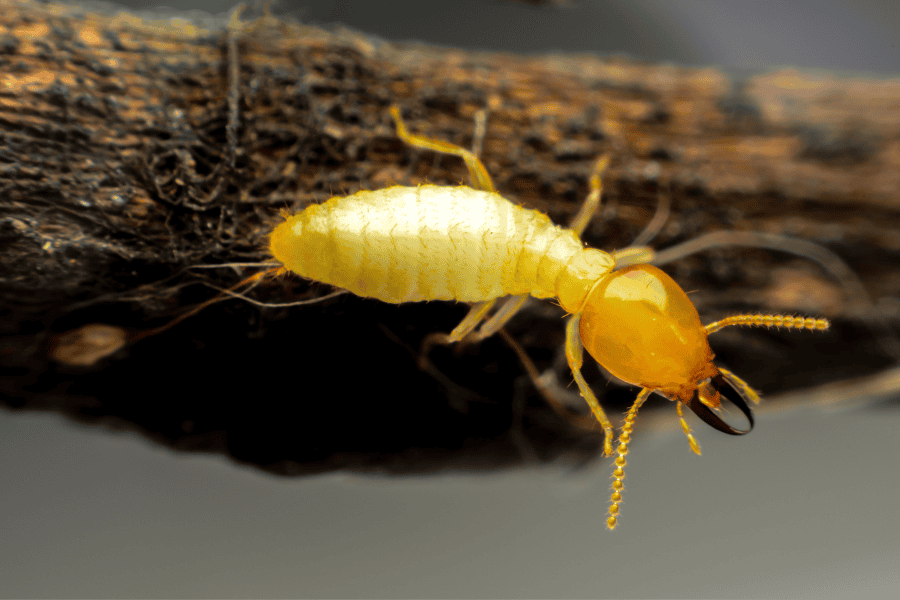READY TO GET STARTED?
REQUEST A FREE ESTIMATE
Fill out the form below or call (888) 466-7849 for a free, no-obligation estimate.

Ghost ants are a common nuisance in Florida, especially during warm, humid months. Small but persistent, they often invade homes in search of food and moisture. Their pale, translucent bodies and dark heads make them hard to spot, and their ability to form multiple colonies indoors makes them tough to eliminate. Knowing where they hide and how to prevent them is key to keeping these tiny pests out.
Ghost ants are drawn to moisture and sweets, often showing up in kitchens and bathrooms. Here’s how to spot an infestation:
If you spot any of these signs, act quickly to prevent the problem from spreading.
Ghost ants are masters of staying out of sight, which makes them especially challenging to deal with. They can squeeze into incredibly tight spaces and establish nests in various hidden areas. Here are some of their favorite hiding spots:
Baseboards provide a discreet entry point as well as a cozy nesting area. These spots are particularly appealing in homes with moisture issues.
Leaky pipes and damp cabinets create ideal conditions for these ants. Inspect these areas frequently, as they’re a common hotspot for ant activity.
Ghost ants often nest within the moist soil of indoor plants, so be sure to check for unusual movement around your greenery.
Small spaces like electrical outlets or wall voids are perfect for these ants to build nests and expand their colonies unnoticed.
Ghost ants are drawn to food sources, and kitchen appliances often provide hidden crumbs and moisture. Check behind refrigerators, under toasters, and inside cabinets for signs of activity.
Ghost ants are persistent, but with a few proactive steps, you can keep them out.
Because ghost ants form multiple colonies, a persistent problem may need professional treatment.
Ghost ants may be tiny, but the inconvenience they bring is anything but small. By understanding the signs of an infestation and taking proactive steps to prevent them, you can keep your home ant-free and comfortable year-round. Contact a trusted pest control professional for expert advice and effective treatments to reclaim your home today!

Attics in Pompano Beach, Florida, may offer hidden shelter for pests like rodents, termites, and bats. The area’s warm climate and humid conditions create the perfect environment for infestations. Quiet, dark, and full of food sources like wood and insulation, attics quickly become a pest haven. But homeowners can take smart steps to keep attic pests from infesting!
Pests are naturally drawn to attics for several reasons:
The good news? With proactive measures, you can stop attic pests from settling in.
Schedule routine attic checks for signs of pests, such as droppings, nests, or gnawed materials. Professionals can perform thorough inspections to catch what you might miss — and recommend preventative steps like attic insulation services, which help block pests while improving energy efficiency.
Prevent access by sealing cracks, damaged vents, and other potential entry points. Use caulk, wire mesh, or steel wool to block openings. Regularly inspect your roof, chimney, and attic for damage.
Attic pests thrive in damp and cluttered spaces. Address these issues by:
Take steps outside your home to reduce the attraction of pests:
If pests invade, opt for environmentally healthy solutions. Natural repellents like peppermint and citrus sprays, humane traps, and diatomaceous earth are effective and toxin-free.
An attic infestation can lead to serious issues. Rodents chew electrical wiring, increasing fire risks, while termites and carpenter ants damage structural integrity. Pest droppings also pose health risks, and severe infestations can be costly to resolve. Prevention protects your home, health, and wallet.
Keeping pests out of your attic is achievable. With regular maintenance, sealed entry points, and eco-friendly pest control, your attic can remain a pest-free zone. Don’t wait for pests to settle in; act now to protect your home and family.
Need help? Contact a trusted pest control professional to ensure your attic stays off-limits to unwanted visitors. Give us a call or click the button below to get started with your FREE quote.

Spring in Naples is a time of renewal—clear blue skies, lush greenery, and blooming flowers. But with warmer temperatures and rising humidity come some less welcome visitors—household pests like ants, mosquitoes, and rodents. While dealing with pests is a reality for most homeowners during spring, traditional pest control methods can harm the environment, your health, and your home. This year, why not take a sustainable approach? Protect your home, loved ones, and the natural beauty of Naples with these eco-friendly pest control tips.
Now that you’re ready to adopt sustainable pest control methods, let’s tackle some of the most common springtime pests in Naples homes.
Ants are a persistent problem and can quickly become an indoor nuisance. Instead of reaching for chemical sprays, consider these eco-conscious strategies.
Mosquitoes not only cause itchy bites but can also carry diseases. The combination of warm weather and sitting water in Naples makes this region particularly susceptible.
Rodents are drawn to warm homes and readily available food supplies, especially as the season changes.
By choosing eco-friendly pest control methods, Naples homeowners can help protect the beautiful community while maintaining a healthy home. Simple steps like using natural deterrents, along with professional green treatments, can deliver effective results while being kind to the environment. Sustainable pest control services not only target pests but also reduce the impact on local ecosystems, giving homeowners peace of mind and a pest-free home.

As temperatures drop in Florida during December, homeowners often find themselves facing an increase in rodent activity. While Florida’s warm climate means pests like rats and mice are a year-round concern, winter months bring a few specific challenges that make Florida rodents more of a problem. Here’s why December is a particularly tricky time for rodent control in the Sunshine State.
Even though Florida doesn’t experience extreme winter weather, the cooler temperatures of December still drive rodents indoors. Rats, mice, and squirrels are all looking for warmth, food, and shelter as their natural outdoor food sources become scarcer and the air chills. Your home, with its heat and accessible food, becomes an attractive target.
A small rodent infestation in December can rapidly turn into a big problem. Mice and rats breed quickly—mice can reproduce as often as every 3 weeks! If you don’t address the issue right away, a handful of rodents can turn into dozens, causing more damage and creating more health risks as the season goes on.
Rodents are notorious for chewing on electrical wires, insulation, and even structural elements of your home. This can result in costly repairs and pose fire hazards. In addition to physical damage, rodents are carriers of diseases like salmonella, leptospirosis, and hantavirus. When they enter your home, they bring these health risks along with them.
As the days get shorter and the nights get longer in December, rodents become more active after dark. They often search for food during nighttime hours when there’s less human activity. If you’ve noticed strange noises or signs of gnawing at night, it could be a sign of an infestation.
The best time to deal with a potential rodent problem is before it gets out of hand. In December, rodent-proofing your home is crucial. Sealing entry points, setting traps, and eliminating food sources are all effective measures to keep rodents out. The earlier you address the problem, the easier and more cost-effective it will be to eliminate.
December presents unique challenges for Florida homeowners when it comes to rodent control. As Florida rodents seek shelter from the cooler weather, they can cause damage, spread diseases, and multiply quickly. By being proactive in rodent prevention, you can ensure your home stays clean and rodent-free throughout the winter months. If you encounter persistent rodent issues, consider contacting a local pest control company for expert assistance and tailored solutions to protect your home.

Living in beautiful Broward County comes with its perks—sunshine, beaches, and vibrant neighborhoods. However, it also means dealing with a variety of pests that can invade your home. Understanding the common pest problems in the area can help you take proactive measures to keep your home pest-free. Here’s what every homeowner should know about common pests in Broward!
Ants are among the most common pests in Broward. Whether it’s fire ants, sugar ants, or carpenter ants, these little critters can be quite a nuisance. They often enter homes in search of food or shelter. To keep them at bay, make sure to seal up any food in airtight containers, clean up spills promptly, and seal cracks around your home.
Termites can cause significant damage to your home if not caught early. In Broward, the warm climate makes it an ideal environment for these wood-eating insects. Regular inspections by a pest control professional can help you catch any termite activity before it turns into a major problem. Look for signs like mud tubes or discarded wings around your home.
Rodents, including rats and mice, are another common issue. They can enter through small gaps and reproduce quickly, leading to larger infestations. Keeping your home clean and clutter-free is key. Make sure to store food in sealed containers and repair any holes in walls or foundations to deter these furry intruders.
Cockroaches thrive in warm, humid environments, making Broward an ideal habitat. These pests are not only creepy but can also pose health risks. To prevent an infestation, keep your kitchen and dining areas clean, fix leaky pipes, and ensure all food is stored properly.
While mosquitoes are more of an outdoor issue, they can become a significant problem during certain times of the year. Standing water is a breeding ground for these pests, so it’s important to eliminate any stagnant water around your yard. Consider using repellents or citronella candles when enjoying your outdoor space.
For pet owners, fleas and ticks can be a major concern. These pests can hitch a ride on your furry friends and quickly infest your home. Regular grooming and using preventative treatments for your pets can help deter these pests. Additionally, vacuuming frequently and washing pet bedding can minimize the risk of an infestation.
Being aware of these common pests in Broward is the first step toward prevention. Regular maintenance can go a long way towards keeping your home pest-free. If you find yourself facing a pest issue, don’t hesitate to reach out to a local pest control professional. They can provide tailored solutions to keep your home pest-free and comfortable.